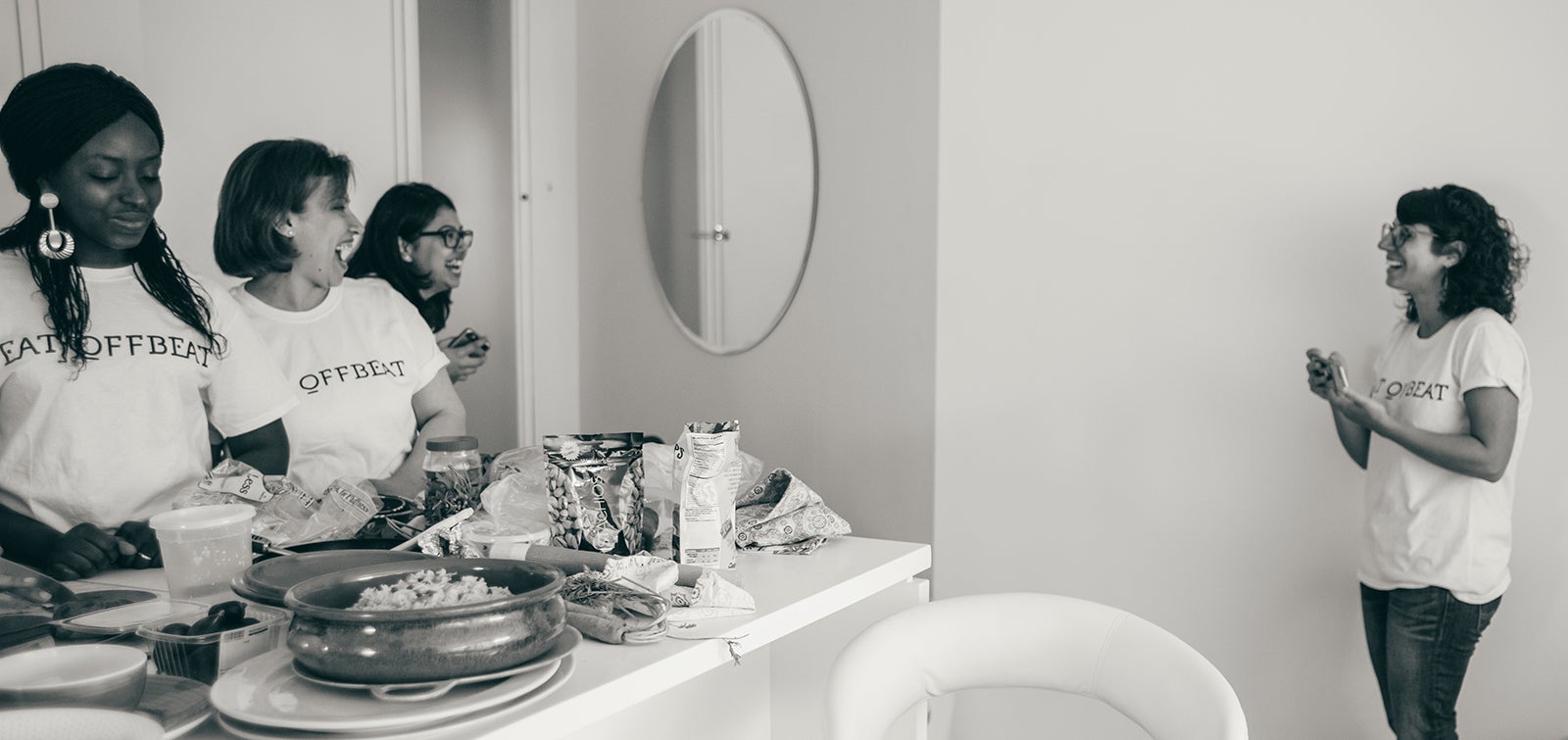This Founder Is Broadening Americans’ Culinary Horizons While Empowering Refugees
Manal Kahi says the employees of her catering business Eat Offbeat are ‘refugees by status, but chefs by nature.’

Opinions expressed by Entrepreneur contributors are their own.
Manal Kahi didn’t found her startup with the purpose of helping refugees. Rather, she saw an opportunity for refugees to add value to the lives of others.
The company, Eat Offbeat, is a catering service that cooks authentic ethnic meals for groups of 10 or more. The meals are conceived, prepared and delivered by 18 chefs from 12 countries — all are refugees who now reside in New York City. Most are from places that are underrepresented in the U.S. restaurant scene, such as Eritrea and Senegal. Customers can mix and match dishes from different chefs and countries into a single menu and transcend the limits of a typical fusion dining experience.
In addition to providing jobs to refugees with untapped talent and giving Americans the chance to taste new cuisines, one of Eat Offbeat’s major goals is to change the narrative around refugees, Kahi explains. She says that the company tries to avoid framing its chefs based on their status, as refugees, and avoid constructions such as “refugee chefs.” In all of the company’s external communication, Kahi says it strives to portray its chefs as happy, courageous and resilient, while erasing the negative connotation of refugees as people who are vulnerable or need help.
Related: Founders of Venmo and Foursquare Explain How Entrepreneurs Can Help Immigrants
To that end, Eat Offbeat also emphasizes that it is a for-profit company, not a charity, though Kahi explains that its strong social mission makes it difficult for some people to picture it as a competitive, highly scalable business which is eligible for investments rather than grants.
In some ways though, Eat Offbeat’s social good mission has directly benefitted its bottom line. Kahi spoke with Entrepreneur about why she’s working to change people’s perspectives.
This conversation has been edited.
What have you learned about growth while doing good?
Even for businesses that don’t have a social mission, growth is really hard and always comes with a lot of pain — which is sometimes a good problem to have. In our case, I would say growing was actually easier due to our mission, and not the other way around. Our mission has given us a great edge and resulted in people coming to us. Most of our customers come through word of mouth. But I did learn that it’s incredibly hard. When we first started, we thought we would already be operating at full scale in the first few months. We were very naive. It took more than a year to get to a place where we’ve started feeling that we’ve started growing.
What have you learned about culture while doing good?
We already have 12 countries represented in the kitchen, so we can’t speak of a culture. It’s really cultures that we have. But somehow, people manage to come together. In this case, everyone is bringing their own dish, and they’re building a common menu. So that helps us all unite over one common culture. Language and cultural differences have been one of the least challenging aspects for us. Most of our chefs are bilingual if not trilingual, so there’s always someone who’s translating to the other person. If anything, those differences are an advantage for us.

At the end of the day, you realize that it’s all really the same. Once, we were looking for new menu items, so we asked the chefs to try something new. And both the Iraqi chef and the Nepali chef mashed potatoes and made them into bowls. They filled them with different fillings — one was vegetarian, the other had beef — and they deep fried them. They tasted completely different, because they had different spices, the texture was a bit different. It shows that we’re all the same, except there are these different spices that make us different and so rich and so unique.
Related: This Founder Shares How She Was Able to Bootstrap Her Way to Success While Giving Back
What advice do you have for other businesses looking to do good?
Since we started, we’ve been very focused, both in terms of mission and in terms of business goals. The small steps might change every now and then, but we’re always looking at the same point at the end. So, keep focused, and never underestimate that the social impact side can actually be a great advantage, and not the other way around. Always see it as leverage, and not as something that will take you back.
Manal Kahi didn’t found her startup with the purpose of helping refugees. Rather, she saw an opportunity for refugees to add value to the lives of others.
The company, Eat Offbeat, is a catering service that cooks authentic ethnic meals for groups of 10 or more. The meals are conceived, prepared and delivered by 18 chefs from 12 countries — all are refugees who now reside in New York City. Most are from places that are underrepresented in the U.S. restaurant scene, such as Eritrea and Senegal. Customers can mix and match dishes from different chefs and countries into a single menu and transcend the limits of a typical fusion dining experience.
In addition to providing jobs to refugees with untapped talent and giving Americans the chance to taste new cuisines, one of Eat Offbeat’s major goals is to change the narrative around refugees, Kahi explains. She says that the company tries to avoid framing its chefs based on their status, as refugees, and avoid constructions such as “refugee chefs.” In all of the company’s external communication, Kahi says it strives to portray its chefs as happy, courageous and resilient, while erasing the negative connotation of refugees as people who are vulnerable or need help.





